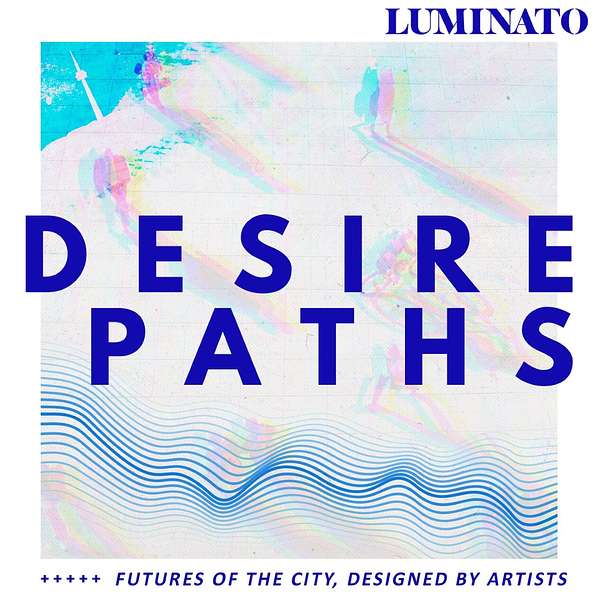
Desire Paths
Desire Paths are unpaved passages, slowly carved into the terrain of a city, formed by the citizens' own walking tracks, and guided by their belief in a better way.
Desire Paths is a six-part series of audio experiences that explore Toronto futures, designed by artists. Through field trips, self-guided narration, and interviews, each episode will offer a unique view into the artist’s imagination, inviting the listener to reflect on desired paths to shape the next decade in Toronto.
Field trips across the city provide the backdrop for reflection through movement and physical presence, allowing artists to connect their personal histories and lived experiences to their vision for possible futures. With premonitions in mind, the second part of each episode will delve into a conversation between the artist and a city-builder to explore how to bring this desired path into being.
Desire Paths is part of Luminato’s Illuminating Ideas program; a series of conversations and experiences that creatively explore some of the most important issues and ideas facing our world today.
Desire Paths is produced by Alex Rand, and co-curated by Hima Batavia and Alex Rand, with Creative Producers Macy Siu, Jeremy Glenn, and Robert Bolton of Toronto-based foresight studio, From Later.
Desire Paths
Pree Rehal: Accessible Futures
“Access needs or even just like planning for disability and access is not a one size fits all. It can be really harmful when there's just a document or a toolkit that's like ‘here’s access planning 101’. There can be so many conflicting access needs – you can't anticipate a certain body or a certain kind of disabled person being in this space or participating in this space.”
In our fifth episode, artist Pree Rehal guides us through the spaces in the city where they feel safe and cared for –from their homespace, to Allan Gardens, to the Paperhouse Studio, an experimental arts studio and community space. Along the journey, Pree is joined by their sibling Harmeet Rehal, and facilitator Cara Eastcott, as they collectively discuss access intimacy, disability, and transformative justice, and what it means to honour crip time.
How can we rethink notions of time and space to design brave places where we can be our authentic selves? What has the pandemic exposed about the everyday challenges of folx with disabilities and how can learnings transform organizational structures? And what do futures of the disability justice movement look like to create more space for intersectionality moving forward?
Pree Rehal (they/them) is an artist educator currently based in Tkaronto, originally from Tiohtià:ke. They're a child of immigrant settlers from Punjab. Pree's work is an ode to their extended youth as a trans and non-binary person, while also painting love letters to their inner child, and affirming their queer, disabled, fat self. Their main medium is watercolour, but Pree also embroiders, creates short films, zines, and performs drag. They have an interdisciplinary arts practice under the name Sticky Mangos and co-founded the Non-Binary Colour Collective. They are also the editor and designer of CRIP COLLAB, a collaborative zine for Disabled artists. Pree's work has been featured in CBC, Xtra magazine, BlogTO, and Salty. Instagram @stickymangos
Cara Eastcott is a culture worker based in Toronto, who has been shaping multi-disciplinary arts spaces for the last 15 years. She has done extensive work in creating accessible practices for Deaf and disability arts to thrive. Her work highlights storytellers who help communities gain a deeper understanding of place and is centred in the preservation of public cultural histories through intergenerational exchanges, oral storytelling, and relationship building.